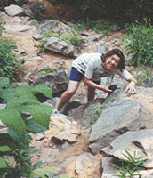Pia Duryea, International Naturalist
Community Building in the Washington, DC area!!
 |
|
SFP Editor: What surprised you the most about your visit to Croatia? Why did you visit?
Pia Duryea: I went to Croatia about 1-1/2 years ago to visit a Yugoslavian exchange student from high school. She wanted to show off her country and it's beautiful!! In fact, parts of Croatia are UNESCO protected to keep them from being spoiled. The Croatian coastline was not polluted during the Communist era and as a result the water is as pure as in the Caribbean, you can still see the bottom of the water 6 feet deep. Even inland there are protected areas that look like parks in any developed nation. In fact, Croatia itself is more Westernized than I'd have thought, because they were so close to Europe. The people are VERY well educated and younger generations are interested in the US and speak great English. Older generations however, aren't. I would definitely recommend people visit if you get a chance. When I was there though (about one and one-half years ago) there was still tension and you could see damage from the war. Literally thousands of acres had been set one fire reportedly by Bosnian Serbs. And in the countryside, there was so much destruction - fields that had been destroyed, stone foundations where houses once stood, people living in makeshift homes. Dubrovnik was devastated though you could see how beautiful it once was. They are rebuilding with materials from the same region (bricks, slate, etc.) however you can still see they are new and not aged like the original materials.
SFP Editor: You have worked for 7 years for a Japanese company. What about the work culture in a small Japanese firm do you think differs from the US work ethic?
Pia Duryea: We are actually a US company but deal most with big Japanese conglomerates. The conglomerates act as umbrella companies so working with one part gives you access to lots of divisions, which makes networking very important. Working with Japanese people was interesting because until recently people in Japan would work up the ladder in a company for a good portion of their lives so one is always dealing with the same person in the same company - not much change and a sense of family within the organization. People are loyal to their employers and vice versa. That is something one does not see in the US at all. Yes businessmen in Japan do not their head as a greeting and showing respect to those senior is very important.
SFP Editor: How was shopping in Nepal? What would you recommend to travelers when visiting this part of the world?
Pia Duryea: My sister and I went to Nepal a few years ago. They eat yak everything over there- and put yak butter in their tea. Don't be turned off though, it's not so bad. Kathmandu has many cultures and many types of food, but Nepali food was pretty tasteless. Of course there's a lot of vegetarian food.
As for shopping, the best tip I got was, say you're Canadian! You automatically get a much lower price. I wish we had known more of the language but people appreciated that we tried and taught us new phrases. "Thank you" is an important word to know. The key to bartering though is remember that it's supposed to be a social thing, even fun. People who are ruthless or unfriendly get taken advantage of and probably don't have a good time either. We got the best deals from the people we were most friendly to. We even got stories about people's families, different parts of the coutry- it was like a learning experience. Complimenting people on their wares helped a lot, and we would let the person know that we WANTED to buy something from them, but that we couldn't afford that price and couldn't they try and give us a better price. In the end, I thought of shopping in Nepal as a social- versus financial- experience.
SFP Editor: Having traveled and experienced so many cultures, what is the next step in your career?
Pia Duryea: If possible, I'd like to continue working in an international context in which I can apply the knowledge I have acquired through work, travel and family heritage. I am also interested in conservation. There are many ways in which nature can be preserved through technology such as solar energy and economic incentives can be used to encourage conservation. As you can see from my picture, I like to bond with nature!
